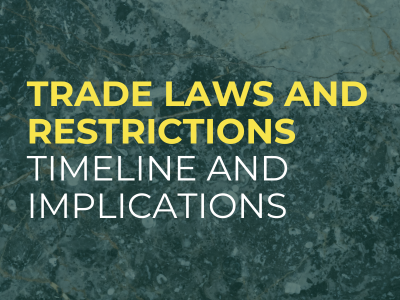
The EU Corporate Sustainability Due Diligence Directive (CSDDD)
As the European Commission moves forward in its quest to create a more sustainable and responsible business landscape, the proposed EU Corporate Sustainability Due Diligence Directive (CSDDD) is set to become a cornerstone of this effort.
In this blog, we will delve into the key aspects of the CSDDD, its significance, the businesses it will affect, and how companies can prepare for the changes.
What is the CSDDD, and why is it so important?
The CSDDD, proposed by the European Commission, is an instrumental piece of legislation aimed at compelling both domestic and international companies operating within the European Union to take accountability for their environmental and social impacts, inclusive of those generated by their supply chains. This directive will mandate these corporations to identify, mitigate, and prevent both actual and prospective repercussions of their operations on human rights abuses and the environment.
Moreover, the CSDDD will necessitate companies to carry out thorough due diligence throughout their entire value chain. This includes the actions of their subsidiaries and any other entities within their value chain with which they are directly or indirectly engaged in business relationships.
This legislation is essential as it addresses the pressing need for enhanced corporate accountability and transparency in the face of increasing social and environmental challenges.
Who will the CSDDD impact?
The Directive will apply to a wide range of businesses, including:
1. EU-based companies with over 500 employees and a net turnover of more than €150 million worldwide.
2. EU-based companies operating in defined high-impact sectors with more than 250 employees and a net turnover of €40 million worldwide – provided at least 50% of the net worldwide turnover was generated in one high-impact sector.
3. Non-EU companies active in the EU with a turnover of over €150 million in the EU.
4. Non-EU companies, operating in the EU, with a net turnover of more than €40 million generated within the EU – provided at least 50% of the net worldwide turnover was generated in one high-impact sector.
This wide scope highlights the significant impact the Directive will have on a vast number of businesses, compelling them to adopt more responsible and sustainable practices.
The high-impact sectors in which the proposed CSDDD will significantly impact include:
• Mineral Extraction and Metal Manufacturing
• Agriculture, Forestry and Fisheries
• Fashion and Textiles
Each of these industries has unique challenges around sustainability and due diligence relating to raw material sourcing, and energy consumption.
For example, within the mining sector, companies will need to ensure that operations involving extracting valuable minerals or other geological materials adhere to strict environmental and human rights standards. This includes enhancing supply chain transparency, conducting thorough environmental and social impact assessments, implementing robust due diligence measures, and facing potential legal consequences for non-compliance with the proposed sustainability standards.
Industries such as Agriculture, Forestry, and Fisheries, while essential for the global economy and food security, are often associated with negative environmental impacts like deforestation, overfishing, and high greenhouse gas emissions. Their traditional practices can lead to land degradation, reduced agricultural productivity, and threats to marine biodiversity. The lack of visibility in their supply chains also presents challenges in verifying sustainable sourcing and fair worker treatment.
The fashion and textiles industries are closely intertwined and often criticised for their environmental impact and the exploitation of workers in the supply chain. In the fashion and textile industries, businesses will have to prioritise eco-friendly materials, and ethical production methods.
What business models will the CSDDD affect?
Some companies will need to revisit their business models and adapt their strategies to fulfil CSDDD requirements.
Companies operating in manufacturing and production will have to look at incorporating more sustainable practices into their production processes, such as improving energy efficiency and adopting eco-friendly materials.
Retail and wholesale businesses will also be affected by the CSDDD, requiring them to reassess their supply chains and ensure responsible sourcing practices. This may involve collaborating with suppliers who adhere to sustainability standards and promoting the use of ethically sourced products to meet consumer demands for more responsible options.
Service providers and consultancies will need to adapt their business models to integrate sustainable practices into their business suites – such as providing sustainability consulting services, helping clients implement due diligence strategies, and supporting them in meeting the requirements of the CSDDD.
Additionally, supply chain and logistics operations will undergo changes to comply with the CSDDD. Businesses will be required to assess and mitigate potential adverse impacts on human rights, the environment, and good governance throughout their supply chains. This includes implementing monitoring and reporting mechanisms, engaging with suppliers on sustainability issues, and ensuring transparency and accountability at every stage of the supply chain.
When will the CSDDD come into effect?
The CSDDD is expected to be adopted beyond 2024, after which Member States will have two years to implement it into national legislation.
It is currently in the development stage within the European Union’s legislative process, having been adopted in its initial negotiating position by the European Parliament on 1 June 2023. Therefore, the specific details of the CSDDD are still under negotiation among the EU’s core political institutions, and its exact scope and impact remain fluid. The CSDDD, which is designed to be transposed into the domestic law of each EU Member State, will ultimately depend on the outcome of these negotiations and its subsequent implementation in each of the EU’s jurisdictions. The exact date when the CSDDD will come into effect is thus still uncertain.
As the CSDDD is still in the proposal stage, there may be changes and amendments to the initial draft. TDi recommends that businesses keep a close eye on the legislative process and follow our socials for updates to ensure compliance when the Directive comes into effect.
How can companies prepare for the CSDDD?
1. Develop a robust due diligence strategy that identifies and assesses risks related to human rights, the environment, and good governance.
2. Implement processes to prevent and mitigate potential adverse impacts, including establishing grievance mechanisms and engaging with stakeholders.
3. Regularly monitor, evaluate, and report on the effectiveness of their due diligence measures.
4. Foster a culture of sustainability and responsibility within the organisation, which includes training employees on the importance of due diligence and the company’s sustainability goals.
A guide to effective due diligence
Due diligence is a dynamic and ongoing process that involves continuous assessments. TDi has compiled a brief guide on how to review and incorporate effective due diligence into your business:
Risk Identification and Assessment
A risk-based and proportional approach is essential for a company to demonstrate that it is effectively protecting all rights holders within its value chain and not perpetuating abuses. The key is ongoing risk management. We need to move past the notion of due diligence as an annual, static box-ticking practice. Instead, it should be a continuous and robust process with established environmental and social frameworks.
Commitment and Governance
Your company’s commitment to sustainability should not be just a statement. It should be a set of clearly defined policies backed up with access to risk experts and the establishment of appropriate governance models. This is about creating an organisational structure that is capable of coping with the challenges of sustainability.
Integration, Communication and Training
Any findings from assessments and policy requirements should be integrated into existing risk and due diligence processes and systems. But don’t stop there – it’s crucial to communicate expectations to key internal and external stakeholders. Training relevant stakeholders to uphold commitment and carry out due diligence activities is equally critical.
Compliance Tracking and Response
Monitoring and enforcement programs, such as audits, should be set up and implemented to track compliance. But having people, resources, and mechanisms to effectively respond when issues arise is equally important. Where necessary, action should be taken to cease, prevent, and mitigate risks.
Grievance Handling and Remediation
An accessible grievance mechanism should be implemented and promoted to ensure effective investigation of issues. Implementing mitigating actions and providing for remediation are also key components of a sound due diligence process.
Reporting and Review
Finally, regular management reporting and stakeholder communication should be carried out. But remember, due diligence is not a destination. It’s a journey. Regularly reviewing learnings and adjusting for continuous improvement is a must.
How TDi Sustainability can help clients navigate upcoming legislation
Corporate sustainability is not a one-size-fits-all approach. TDi Sustainability is in a unique position to help clients adapt to the variety of upcoming legislations, including the CSDDD. We understand businesses’ challenges in aligning operations with sustainability goals and can provide tailored guidance to help clients preempt any mandatory actions.
TDi Sustainability can assist clients in identifying ways to improve their existing practices and develop strategies to achieve compliance with the CSDDD. Our team of experts can offer valuable insights, industry knowledge, and practical solutions to help clients proactively address the evolving regulatory landscape. By leveraging our expertise, clients can stay ahead of the curve and ensure their businesses are well-prepared for the future. This not only mitigates the risk of non-compliance or reputational damage but also demonstrates a commitment to responsible business practices, which can be a competitive advantage in today’s increasingly sustainability-conscious market.
Contact us today to discuss how we can work together in developing your company’s sustainability strategy and due diligence processes.
Additional support from TDi Sustainability on the EU CSDDD:

Watch and read the transcript for TDi’s Masterclass Webinar on how to prepare for the upcoming EU CSDDD legislation




